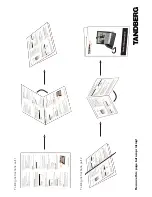
Health and Safety Information
168
Maintaining Safe Use of and Access to Your
Phone
FAILURE TO FOLLOW THE INSTRUCTIONS OUTLINED MAY
LEAD TO SERIOUS PERSONAL INJURY AND POSSIBLE
PROPERTY DAMAGE
IMPORTANT SAFETY INSTRUCTIONS - SAVE THESE
INSTRUCTIONS.
DANGER - TO REDUCE THE RISK OF FIRE OR ELECTRIC
SHOCK, CAREFULLY FOLLOW THESE INSTRUCTIONS.
FOR CONNECTION TO A SUPPLY NOT IN THE U.S.A., USE AN
ATTACHMENT PLUG ADAPTOR OF THE PROPER
CONFIGURATION FOR THE POWER OUTLET.
Using Your Phone While Driving
Talking on your phone while driving is illegal in some states.
Even where it’s not, it can divert your attention from driving.
Remember that safety always comes first.
When using your phone in the car:
●
Get to know your phone and its features, such as speed
dial and redial.
●
When available, use a hands-free device.
●
Position your phone within easy reach.
●
Let the person you are speaking to know you are driving; if
necessary, suspend the call in heavy traffic or hazardous
weather conditions.
●
Do not take notes or look up phone numbers while driving.
●
Dial sensibly and assess the traffic; if possible, place calls
when you stationary or before pulling into traffic.
●
Do not engage in stressful or emotional conversations that
may divert your attention from the road.
Health and Safety Information
169
●
Dial 9,1,1 to report serious emergencies. It’s free from
your wireless phone.
●
Use your phone to help others in emergencies.
●
Call special non-emergency wireless number when
necessary.
Following Safety Guidelines
Note: Always turn off the phone in health care facilities and request
permission before using the phone near medical equipment.
To operate your phone safely and efficiently, always follow any
special regulations in a given area. Turn your phone off in
areas where use is forbidden or when it may cause
interference or danger.
Using Your Phone Near Other Electronic Devices
Most modern electronic equipment is shielded from radio
frequency (RF) signals. However, RF signals from wireless
phones may affect inadequately shielded electronic
equipment.
RF signals may affect improperly installed or inadequately
shielded electronic operating systems and/or entertainment
systems in motor vehicles. Check with the manufacturer or
their representative to determine if these systems are
adequately shielded from external RF signals. Also check with
the manufacturer regarding any equipment that has been
added to your vehicle.
Consult the manufacturer of any personal medical devices,
such as pacemakers and hearing aids, to determine if they
are adequately shielded from external RF signals.
Summary of Contents for SGH-P716
Page 6: ...Table of Contents 6 ...
















































